THE FAIRBAIRN COBRA EVALUATION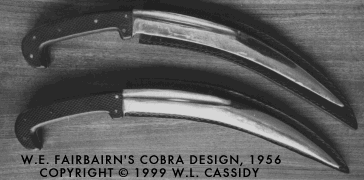
[
Original design by WE Fairbairn] To my knowledge two knife-makers have offered their take on the Fairbairn Cobra.
 [Dan Brock design]
[Dan Brock design]In America, Dan at the
Ploughshare Forge was first to put the design into reality, then more recently,
Paul MacDonald has produced his version, and it is this latter that I have been able to evaluate, thanks to my good friend Victor.
Both makers copied the knives from the only known photographs of the Cobra prototype, as published by researcher William Cassidy in 1999. The first thing we must note is that Cassidy warned “Also, the two prototypes he had bear only slight resemblance to the blueprint. His son told me he didn't like the prototypes and that he couldn't find anybody in Britain who cared to help him” So the prototypes, as photographed, were not really what Fairbairn had in mind. The question remains, what did the Cobra look like?
In the following evaluation I will firstly concentrate on the execution of the design, then finish with my opinion on the practicality of the Cobra design.
THE MacDONALD COBRA REVIEW
From the photos I had always envisioned this knife to be massive, and probably ungainly. I was pleasantly surprised upon opening the package, that the weapon, while big, is nicely proportioned and sits in the hand well.
We will go over the knife in detail, starting with the sheath. Frankly, the sheath is a joke. I’m no leather expert, but I have been a discerning user of holsters and other accessories for decades, and appreciate good leather work.....and this isn’t good leather work.

For a start, the sheath, which is very soft, glove-type leather, tends to mould to the blade, making removal almost impossible. It takes a lot of effort, and two hands to remove the sheath. A fast draw would be impossible; but since the loop won’t fit a military belt, this is a moot point. Finally, there is no welt on the edge side of the sheath, so eventually the blade will cut through the stitching. [See post below for further on the draw/sheath]
The sheath on the Dan Brock version, in the first picture of this thread, seems much more like what is needed.
The handle is made from Oak, and fits my [rather large] hand well. Chequered well for grip, with additional checkering on the topstrap [with matching grooving on the blade] for placement of the thumb in Sabre grip.
 [Chequering detail. Note also massive thickness of blade]
[Chequering detail. Note also massive thickness of blade]My only gripe with the grip is that there are numerous tool marks left in the wood.
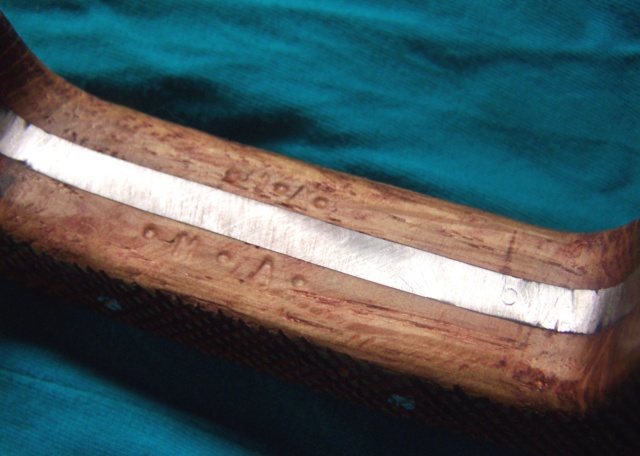
The blade is, without doubt, the best part of the weapon. Ten inches of sturdy construction, beautifully curved, with a wicked point.

MacDonald supplies the knife with a dull edge, for wall hanging, or, sharpened for actual use.
THE COBRA CONCEPTAccording to Cassidy, the Cobra was a necessary evolution in knife design because of future threats:
“No doubt inspired by changes he saw in post-war Asia (the Empire was crumbling), Fairbairn foresaw a time when "western-trained" knifefighters would confront "eastern-trained" knife fighters. While he had confidence in the Shanghai School methods of which he was the principal author, he was less sanguine about the abilities of the various practitioners. He also saw trouble looming in the Middle East, so he set about to instruct himself in the indigenous forms of knife fighting to be found there. Such thinking was, of course, a measure of his greatness.”
As pointed out by Marcus Wynne, Al Qaeda terrorists have received training from Filipino-Muslim knife experts, so WEF was quite prescient.
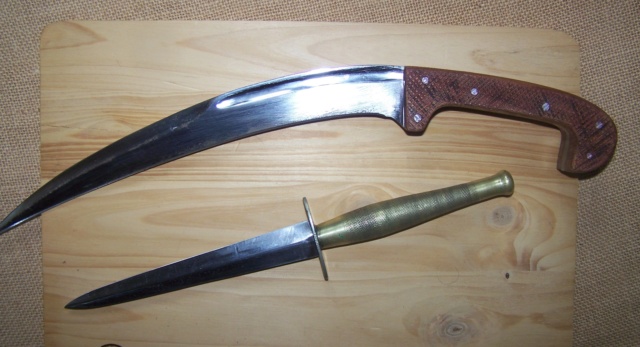 [Cobra compared with Fairbairn-Sykes]
[Cobra compared with Fairbairn-Sykes]Personally, I was surprised how handy the Cobra is. It’s well balanced, and agile in the hand..
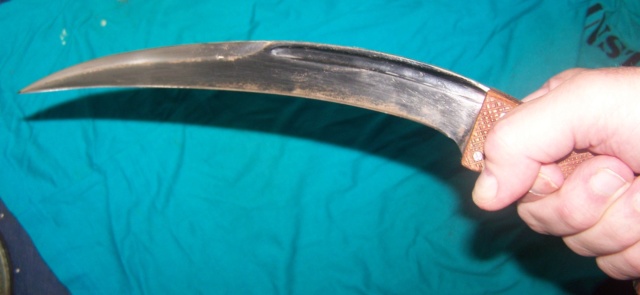
For me the downward arc was much more natural than the upward curve of the
Arab knife...
Again, quoting Cassidy: “The style of play is quite unique. Whereas the Shanghai School is centered on speed, the Cobra style is centered on confusion”
The blade has a sharpened back edge ["false edge"] of 6" length.

This adds to the toolbox of techniques that can be employed, such as backcuts and rip-outs. Also it makes the thrust easier, as the point is backed by two sharp edges.
I've been further evaluating the Cobra, especially the belt carry and the draw.
I was pleasantly surprised to find that the knife works well on the belt. I had doubts about that 14" long weapon being anyway handy to carry.
To quote Fairbairn: "The COBRA Fighting Knife was designed to be carried on the left side of the belt. The sheath has been fitted with a canting loop, which brings the hilt of the knife within comfortable reach of the right hand and permits you to run or sit down in a car, etc., without having to push the knife around to the back of the body where it would be impossible to make a "quick draw".

[
Knife in sheath on belt, note the angle]It seems that Fairbairn was spot on in his design parameter, and Paul MacDonald has executed it well.
The knife hangs at the optimum angle, then, upon drawing the loop allows the sheath to swivel to a more horizontal angle for a natural draw.....

Due to the clinging, soft leather, this will never be a lightning fast draw, but it is nevertheless, quite workable.
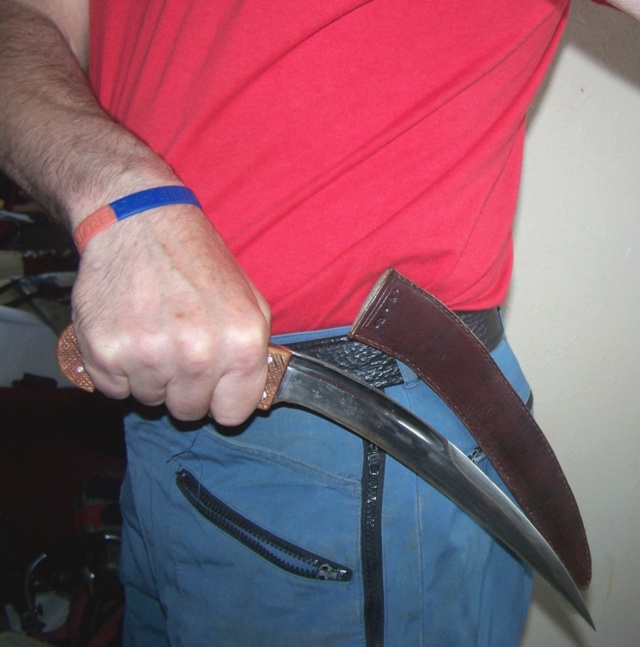 [Sheath on belt, knife in hand]
[Sheath on belt, knife in hand]The carriage and draw of a blade of this size is never going to be as convenient as more compact designs. However, it was designed primarily for soldiers rather than civilian EDC.
The more I work with the Cobra the more I like it.
In a future article I’m intending on covering the techniques of the Cobra.
